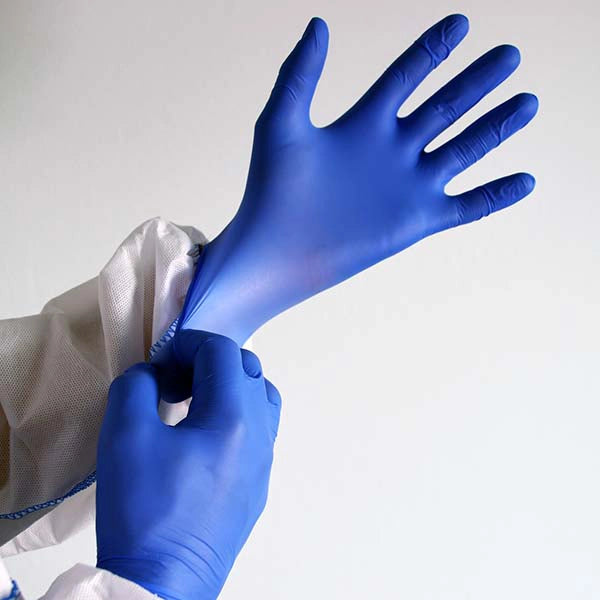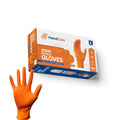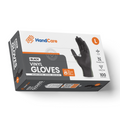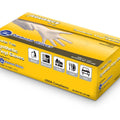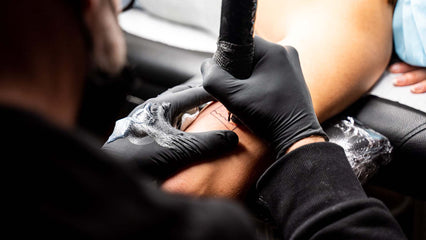Disposable gloves can keep your hands safe while working in a wide variety of different settings and industries.
Unfortunately, those of us with sensitive skin know that sometimes, the threat is “coming from inside the house,” so to speak: the gloves themselves can be a problem, causing allergic reactions or skin irritation on the hands they’re meant to protect.
In order to keep your hands comfortable and healthy, it’s important to be choosy when comparing different disposable gloves. Picking out the right pair of disposable gloves for sensitive skin means weighing the material used to make the glove along with the level of quality in manufacturing.
Of course, there are a ton of options out there to choose from, and it’s not always easy to sort through them. Fortunately, we’ve got you covered.
In this article, we take a look at the reasons why disposable gloves might cause irritation for people with skin sensitivities. Then we’ll take a look at the different choices out there and help you learn which are the best disposable gloves for sensitive skin on the market.
Best Gloves For Sensitive Skin In 2025
1. HandCare Blue Nitrile Gloves (4 Mil)
These exam-grade nitrile gloves are powder-free and provide superior puncture resistance and durability. They are latex-free, making them safe for users with allergies.
Comfortable and easy to wear, they offer excellent tactile sensitivity for precision tasks. Designed for a snug fit, these gloves emulate the elasticity of latex without the risk of allergic reactions. Their vibrant blue color adds visibility in various environments.
Uses:
Ideal for healthcare applications, food preparation, laboratory work, and light industrial tasks.
Details:
• Thickness: 4 Mil
• Material: Synthetic nitrile rubber
• Features: Powder-free, latex-free, textured fingertips for grip
• Packaging: 1,000 gloves per box
2. HandCare Orange Nitrile Gloves (8 Mil)
These heavy-duty nitrile gloves are designed for maximum protection against chemicals and abrasions. They are powder-free, latex-free, and thicker for enhanced durability. The bright orange color improves visibility, making them ideal for high-risk environments.
Textured for superior grip, these gloves perform well in wet or oily conditions. Comfortable and flexible, they provide extended wearability without discomfort.
Uses:
Perfect for industrial work, automotive repair, chemical handling, and janitorial tasks.
Details:
• Thickness: 8 Mil
• Material: Synthetic nitrile rubber
• Features: Powder-free, textured surface for grip
• Packaging: 1,000 gloves per box
3. HandCare Black Vinyl Gloves (3 Mil)
These lightweight vinyl gloves are affordable, allergen-free, and perfect for short-term use. They are powder-free and latex-free, ensuring safety for users with sensitive skin. Soft and flexible, these gloves provide decent dexterity for low-risk tasks.
The black color offers a professional look and masks stains for a clean appearance. Easy to put on and take off, they are a reliable option for quick changes.
Uses:
Commonly used in food service, light cleaning, and non-hazardous medical exams.
Details:
• Thickness: 3 Mil
• Material: Polyvinyl chloride (PVC)
• Features: Powder-free, latex-free, soft and flexible
• Packaging: 1,000 gloves per box
4. ADVANCE Stretch Vinyl Gloves (4 Mil)
These stretch vinyl gloves combine flexibility and comfort, offering enhanced performance compared to standard vinyl. They are powder-free and latex-free, ensuring they are safe for individuals with sensitive skin. Their snug fit and lightweight design make them ideal for prolonged use.
Resistant to punctures and tears, they provide reliable protection during light tasks. The clear material ensures a professional appearance in any setting.
Uses:
Best for food handling, cleaning services, and non-sterile medical applications.
Details:
• Thickness: 4 Mil
• Material: Stretch vinyl
• Features: Powder-free, latex-free, enhanced flexibility
• Packaging: 1,000 gloves per box
Why Wearing Disposable Gloves Causes Skin Irritation
The short answer: allergic reactions to latex.
When the surgeon William Stewart Halsted introduced rubber gloves in the 1880’s to protect a member of his staff who suffered from contact dermatitis, they were a major step forward in medical safety. As the first disposable rubber gloves developed for use in medicine, latex gloves were and are popular in many settings due to their comfortable fit, high level of protection, and their precision in terms of feel and touch.
Unfortunately, there’s a catch: it turns out many people have latex allergies or are otherwise sensitive to the proteins within the natural latex that the gloves are made of, especially after prolonged use. If you’ve developed itchiness, hives, or blisters after wearing latex gloves, you’re in good company: up to 17% of healthcare workers have developed hypersensitivity after repeated exposure.
The range of latex allergies’ severity can vary widely. For some people, the immune system reacts so strongly to latex proteins that their blood pressure drops and anaphylaxis can set in. Some people also experience reactions to the powder inside some disposable gloves.
In recent decades, awareness of allergic reactions to latex has increased to the extent that Johns Hopkins Hospital, the place where Dr. Halsted invented latex gloves, have stopped using them in favor of other synthetic materials that most people aren’t allergic to.
What Are The Best Types Of Gloves For Sensitive Skin?

If you have sensitive skin, you’ll want to keep an eye out for latex-free disposable gloves. While you’re at it, make sure they’re powder free. Fortunately, there are quite a few different choices out there that can protect your hands from whatever the work day brings without the risk of skin irritations due to a latex allergy.
The most popular options for sensitive skin-friendly gloves are synthetic rubbers like nitrile and vinyl, along with chloroprene or neoprene. These aren’t just latex free, but in many cases have also been dermatologically tested to be gentle on sensitive skin.
Even if you don’t have sensitive skin, latex free, powder-free gloves are a good choice for food service and healthcare workers (or anyone who goes through a lot of disposable gloves), since being repeatedly exposed to the material can actually cause latex sensitivity to develop, even hours after they’re worn.
Nitrile Gloves
In most cases, nitrile gloves are the best disposable gloves for sensitive skin. On top of being safe for people with latex allergies, nitrile gloves are in many ways superior to latex gloves in protecting against many of the hazards workers face throughout the day.
Nitrile disposable gloves are made by a bonding of acrylonitrile and butadiene, which come together to create a synthetic material that emulates natural latex without the proteins that cause skin allergies.
They’re quickly becoming the most popular disposable gloves for sensitive skin. They’re inexpensive, puncture-resistant, and offer greater chemical resistance than latex gloves.
Nitrile gloves also offer good protection against acids, oils, and many other hazardous substances, though there are some situations where nitrile disposable gloves are not ideal, like working with pure alcohols, concentrated acids, or solvents.
In rare cases, some people can still have a reaction to the synthetic rubber that makes up nitrile gloves. This is often caused not by the nitrile itself, but by the accelerants used in the manufacturing process, cross-contamination with latex, or by wearing the gloves for a long time without changing them.
Generally speaking, though, if you have a latex allergy or you just have sensitive skin, nitrile gloves are an excellent alternative to latex gloves.
Vinyl Gloves
Vinyl gloves are another great option for protecting your hands from bacteria and viruses. Their main benefit is being much more affordable than other types of disposable gloves while not causing allergic reactions.
Like the pipes that run through our homes, vinyl gloves are made mostly of polyvinyl chloride. These gloves are great for keeping sensitive skin safe from many non-hazardous materials and for keeping your hands dry — that is, until you wear them too long and your hands begin to sweat!
Vinyl gloves don’t last quite as long as nitrile or latex gloves and should not be used around harsh chemicals or in highly sterile situations.
Vinyl gloves are meant for light duty, short-term wear and should be changed often, but they provide a snug fit and good dexterity, which is ideal for food service and cleaning applications.
Neoprene or Chloroprene Gloves
Neoprene gloves, sometimes referred to as chloroprene, are another synthetic rubber glove that are growing in popularity. Like nitrile, neoprene is latex free, resistant to many kinds of compounds and offers great dexterity.
Neoprene is also useful in high-heat applications and will resist tears at most thicknesses. It also offers good water resistance, lending it popularity in dental and medical offices. As with nitrile gloves, there are certain situations in which neoprene gloves are not recommended.
The main drawback of neoprene is it’s relatively expensive compared to nitrile, vinyl, or even latex. It’s a great choice for sensitive skin, but in many cases you might save money going with nitrile for similar performance at a lower cost.
Which is The Best Glove?

The good news is there are a lot of choices when it comes to the best disposable gloves for sensitive skin.
Nitrile gloves are a great choice for most situations in which you’d need a disposable glove. Neoprene or chloroprene offers similar advantages, albeit at a higher cost. If you’re only doing light duty work, vinyl gloves could be a good choice due to their low cost and comfort.
Where to Buy the Best Glove for Sensitive Skin?
Whichever type of glove you choose, it’s important to make sure you’re purchasing high quality gloves from a reputable company, like gloves.com. Shortcuts taken during manufacturing can mean additives that cause skin irritation or a glove that’s prone to easily tearing or breaking down.
We’ve been in the disposable glove business for 30 years, and our latex free gloves are among the best on the market. Check out our selection today of the best disposable gloves for sensitive skin.
Shop now and save up to 50% on gloves.com

